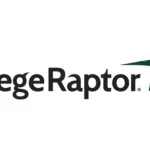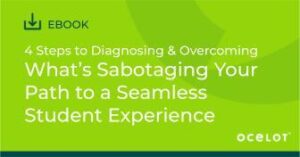At Ocelot, we recently surveyed a group of higher education leaders and 84% said that students who don’t have a connection with their school are more likely to drop out. The causes? The inability to afford living expenses, poor grades, and poor mental health. So, what can colleges and universities do to foster better connections with their students? They can take a proactive approach to addressing enrollment, retention, and student success and engagement. Students need to feel connected to their school and have access to information and the available resources and systems to help them succeed. When schools take the right steps to proactively engage students with genuine empathy, they foster a sense of belonging and lay the critical groundwork for that student’s success.
When schools create a sense of belonging, and students feel connected to their academic communities, they can proactively identify and address problems like mental health issues and other challenges. Recognizing and tackling these issues before they become serious leads to greatly improved outcomes – especially for students between the ages of 18-24, the most common ages for the onset of mental health issues.
Loneliness Hurts More than We Thought
The U.S. Surgeon General recently raised the alarm about the devastating impact of the epidemic of loneliness and isolation in the U.S. The report notes that widespread loneliness in the U.S. poses the same health risk as smoking up to 15 cigarettes a day. The Surgeon General called upon workplaces, schools, technology companies, community organizations, parents, and others to make breakthroughs to walls of isolation and break down the barriers that loneliness creates.
The good news is that higher education leaders can tackle this epidemic by understanding the social determinants of health that impact each student. There is no one-size-fits-all approach to health equity; race, gender, socioeconomic status, food scarcity, and safe and secure housing all contribute to an individual’s health. But technology can help and provide schools with a lot of different touch points for connecting to and understanding their students’ circumstances – including text, ChatGPT, social media, and artificial intelligence (AI). Educational institutions, with the right technology, can be instrumental in the prevention and early treatment of students facing mental health crises.
To get started and deploy technology successfully, an institution must understand the platforms and applications that will most effectively connect them with their students. Schools should look for systems that quickly and easily engage their students with content that is clear and concise. Students are exponentially more likely to engage when it’s easy for them to do so with tools like yes/no questions via text or through simple chatbot dialogue, where responses can be analyzed and/or routed to the appropriate people to address any red flags.
CSU Long Beach Leading with Compassion
As part of its comprehensive mental health strategy, California State University, Long Beach, started a proactive texting campaign with its students. They lead with care and compassion by checking in on their students’ wellbeing with straightforward and engaging questions. Based on student feedback, experts step in to actively promote CSU-Long Beach’s mental health resources. You can learn more about CSU-Long Beach’s proactive approach by watching our recent webinar here.
CSU-Long Beach implemented the Ocelot AI Communications Platform texting capabilities and is currently evaluating its SIS and CRM integration to deliver more personalized responses. Through Ocelot, schools retain complete control over the specific content students receive through the chatbot. And schools can build custom escalation protocols so students receive the level of care required before their situation escalates. To learn more about the services that CSU-Long Beach and Ocelot offer, along with best practices on how colleges and universities can engage students successfully, visit here.
May is mental health awareness month, but it’s always important to focus on providing the best tools and engagement strategies available to make sure all students feel at home, even when they are away from home.














